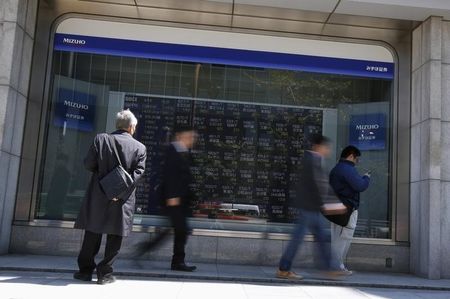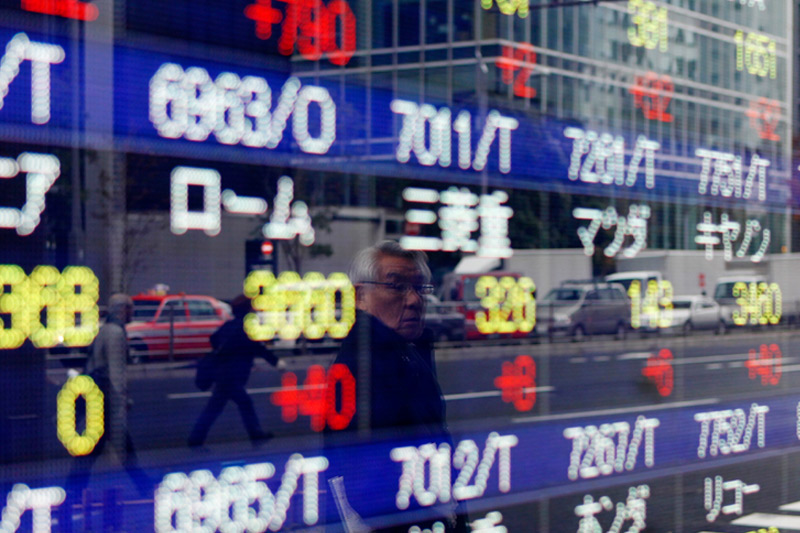By Lisa Twaronite TOKYO (Reuters) - Asian share market sentiment was cautious on Thursday after U.S. President Barack Obama vowed to fight Islamic State militants, while the dollar pushed to fresh six-year highs against the yen.
Chinese inflation data pointing to an economy losing momentum stirred concerns but also some optimism among investors hoping for further stimulus to prop up the world's second-largest economy.
European stocks were set to inch higher, as a poll showing a majority of Scots intend to vote against independence in next week's referendum helped ease recent worries over the future of the United Kingdom.
"Despite all the uncertainty swirling around the markets at the moment, the bears aren't quite convinced that the time is right for a raid and the bulls are still clinging on for potential further upside," Jonathan Sudaria, dealer at Capital Spreads, said in a morning note.
At 0625 GMT, futures for Euro STOXX 50 (STXEc1), UK's FTSE 100 , Germany's DAX and for France's CAC were all up 0.2 percent.
Obama told Americans in a speech late on Wednesday that he had authorised U.S. air strikes for the first time in Syria and more attacks in Iraq in a broad escalation of a campaign against the Islamic State militant group.
He said he would hunt down Islamic State militants "wherever they are."
While overnight gains on Wall Street underpinned shares, the risk-averse mood helped push MSCI's broadest index of Asia-Pacific shares outside Japan (MIAPJ0000PUS) down about 0.1 percent. Hong Kong's Hang Seng Index (HSI) and the Shanghai Composite Index (SSEC), however, both edged up after the China inflation data raised the possibility of more stimulus.
China's consumer prices cooled more than expected in August, up 2.0 percent from a year earlier, missing market expectations for 2.2 percent and down from 2.3 percent in July. The data provides more evidence of economic slowdown but economists are divided over whether Beijing will use the extra room to announce fresh stimulus measures.
"The comfortable inflation figure will provide sufficient room for the central bank to loosen its monetary policy. The possibility of an interest rate cut cannot be ruled out in coming months," said Li Huiyong, economist at Shenyin & Wanguo Securities in Shanghai.
Japan's Nikkei stock average (N225) added 0.8 percent to close at an eight-month high, taking solace from the weaker yen and upbeat data released before the market opened.
Confidence at big Japanese manufacturers turned positive in July-September and business conditions are expected to improve further in the following quarter, a government survey showed on Thursday.
The greenback rose to a six-year high of 107.04 yen <JPY=>, and was last up about 0.1 percent on the day at 106.95 yen.
The euro <EUR=> edged down 0.1 percent to $1.2900, but remained well above its 14-month low of $1.2859 hit on Tuesday.
Rising U.S. yields gave the dollar a lift. The yield on the benchmark U.S. 10-year note (US10YT=RR) stood at 2.527 percent, not far from its U.S. close of 2.536 percent on Wednesday, when it rose to its highest in more than a month.
By contrast, the Bank of Japan drove a short-term interest rate below zero this week, a sign it will continue its aggressive asset purchases.
BOJ Governor Haruhiko Kuroda on Thursday said he told Prime Minister Shinzo Abe that the central bank will not hesitate to ease policy further if its 2 percent inflation goal becomes difficult to achieve, though he also told Abe that a positive economic cycle in Japan is firmly in place.
Traders sold Treasuries to prepare for a more hawkish stance on monetary policy from the U.S. Federal Reserve at its next policy meeting on Sept. 16-17.
Analysts said the Fed could hint at an earlier-than-expected interest rate hike on steady U.S. jobs growth. A study from the San Francisco Fed released on Monday suggested that investors underestimated the speed at which the Fed might raise rates.
Strong Australian jobs data prompted markets to virtually price out the chance of any more interest rate cuts ahead, and helped the Aussie dollar recover from five-month lows. The Aussie rose 0.2 percent on the day to $0.9169 <AUD=D4>, off Wednesday's low of $0.9113, after the country's employment surged by the most on record.
Spot gold prices <XAU=> edged down about 0.1 percent to$1,247.60 an ounce, pressured by expectations of higher rates from the Fed.

U.S. crude inched 0.2 percent lower to $91.52 per barrel, weighed down by rising supply, as OPEC lowered projected demand for its crude and data showed a jump in U.S. refined product stocks.
(Additional reporting by China economics team; Editing by Jacqueline Wong & Shri Navaratnam)
